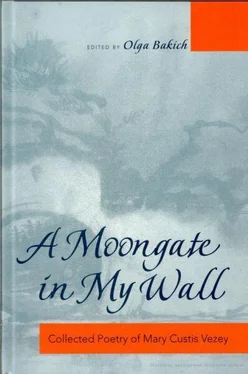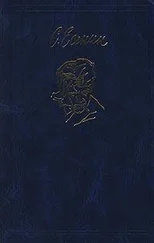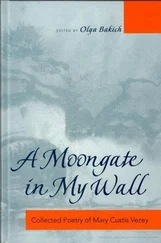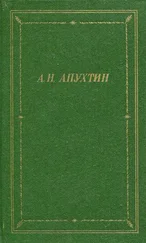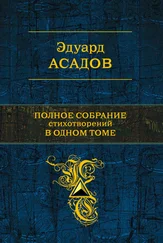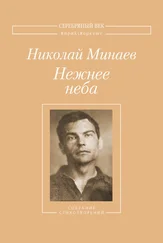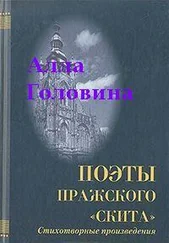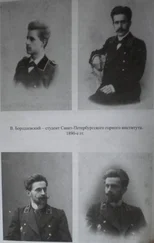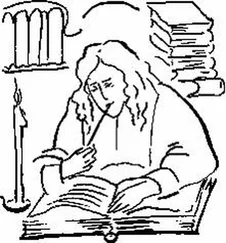In the 1970s and 1980s, Mary Vezey continued to write and translate in Russian and in English. In the summer of 1985, Mary Vezey and Valerii Pereleshin began working on an anthology of Russian poetry of China, tentatively entitled "U dobrogo drakona" (In the Home of a Kind Dragon). [34] Letter from V. Pereleshin to M. Vezey, 27 June 1987.
The work took a lot of time and effort. Pereleshin soon bowed out, hoping that Leiden University would supplement his forthcoming memoirs "Dva polustanka" (Two Wayside Stations) with an anthology He informed Mary Vezey that the joint compilation was now hers alone and in the further correspondence kept calling it "your anthology." When Pereleshin's death on 7 November 1992 ended his indirect participation, Mary Vezey did not abandon the project: "1 hope to complete my literary work, no matter how insignificant it was, with this anthology.” [35] Letter from M. Vezey to O. Bakich, 22 May 1989.
(…) The main desire and goal were to save this 'lost generation' and its valuable heritage from disappearance." [36] Letter from M. Vezey to O. Bakich, 14 February 1991.
In 1991, when Mar)' Vezey was asked about her next collection of poems, the answer was: "I have little time left, and I won't be able to accomplish much. I am not as strong as I used to be. But I would still like to publish three little books of mine: one of poetry (the last one), one of translations into English, and one more (a special one). But before that — not my poetry, but that of colleagues and friends who can no longer do it. [37] Letter from M. Vezey to O. Bakich, 13 May 1993.
(…) I can't allow myself to publish something of mine; my goal is to preserve the unpublished works of my compatriots and colleagues." [38] Letter from M. Vezey to O. Bakich, 14 February 1994.
Mary Vezey died on 18 October 1994 in San Francisco.
In one early poem she wrote: "This is not a poem, this is the music of the soul" (poem 275), and musicality is inherent in her poetry, as it is for many romantics and symbolists who considered music the highest form of art. The tonality of her music is sadness; Blok's "heavy flame of sadness" [39] K. Chukovskii, Aleksandr Blok как chelovck i как poet (Aleksandr Blok as a Person and as a Poet), Petrograd, 1924, p. 135.
is the key to her entire poetry: "great sorrow is given to us, / and we carry it as a banner" (poem 180). Its root lies in the contrast between the crude, gray life on earth and the vision of the other, beautiful world: "the soul did not have enough words / to tell of the sadness of dreams" (poem 468). One of the key symbols of this other, invisible world is a star, and her first collection opens with a poem where a white star falls down "to a cold, dry reality" (poem 1). In a poem dedicated to her brother, the poet says: "We both came not from this world, / but from a different star /(…) we live with a blessed hope / to see that star again" (poem 54).
Sad love lyrics are prominent in her early poetry: "I wrote my poems not for you at all, / but for my dream" (poem 295). Over the years, this "sadness with its enormous eyes" [40] See note 33.
focuses on the sorrows of contemporary life: "there is so little warmth and joy in the world—/God, save and have mercy on people and animals!" (poem 441). The poet sees homeless, sick, old people, lost in a big city, hears an abandoned dog howling by locked gates, mourns the victims of the Civil War in Biafra and of the Vietnam War. Ten terse lines of "Nalet" lAir Raid) (poem 4B1) describe the bombing of a shipyard, the death of thirty-five children in an orphanage nearby, and the shooting down of an airplane. This dispassionate narrative is broken twice: in the second line, a woman's voice begs the pilot: "Take care! God be with you!/' and in the last line the same voice is barely able to contain its grief; "Only one did not come back — mine." The children in the enemy city perished, and so did the beloved who bombed it.
Compassion is powerfully expressed in the poem "Zhena Lota" (Lot's Wife), written in two versions, first in Russian and a year later in English. The theme had already been explored by Anna Akhmatova in her 1924 poem "Lotova zhena" (Lot's Wife), where Lot's wife becomes an image of an exile, ready to give her life for her loyalty to the past. Mary Vezey gives her last glance a different interpretation: Lot's wife tells how, unlike her "God-fearing and brave Lot," she ("And I–I am a woman,") could not walk away without looking back. For her, "sweet was the knowledge, even for a moment, / that at least one, perhaps an enemy or a friend, / on the brink of death, in semi-consciousness, felt the final farewell, / having seen the tremble of my powerless arms" (poem 377). The English poem (poem 533) expresses this with an even greater power and clarity:
I couldn't run away: I stopped and turned—
What matter that the price I paid was life,
was immortality?
Perhaps in that brief moment
some friend or enemy before he died
breathed easier because he glimpsed, half-blinded,
through fire and smoke, beneath a fallen pillar,
my shaking arms stretched in a last farewell?
Loneliness is another key theme; "and no one will hear your voice in the night, / whether you shout or not" (poem 223). [41] Powerful lines of this poem serve as an epigraph to an article on the Harbin literary scene of the 1930s: Ju. Kruzenshtern-Peterets, "Churaevskii pitomnik (O dal'nevostochnykh poetakh)," Vozrozhdenie, no. 204, December 1968, pp. 45–70, and to an article on Russian women poets of China: Olga Bakich and Carol Lid and, "The Eastern Path of Exile: Russian Women's Writing in China," A History of Women's Writing in Russia, ed. by Adele Marie Barker and Jehanne M. Gheith (Cambridge University Press, 2002), pp. 153–174.
Her third collection ends with a poem which says in part: "How frighteningly lonely we are in this world! / In a crowd of people such as us / we wander like lost children, / over the precipice of despair and darkness. / We are fated to face the solitary absence of a path/and an occasional impotent sadness…" (poem 244). Death condemns the living to loneliness; "You have left this world… but where to?/The earth is covered with darkness./(…) What am 1 going to do now / on my cold earth?" (poem 453). She sees her own death as sailing away: "My ship will depart in the same way / for unknown seas, in a desolate night,/and there will be no lighthouse on the rocks,/and not a single star will shine/in the sky, but the helm will turn quietly,/and the hum of the earth will grow quiet behind the stern" (poem 335). This last voyage will lead to those who have already left: "There we'll furl our sails. / The morning of meetings is not tar away!" (poem 457). An angel from an early poem who "opened the black gates of the quiet night" and "sad, sad, stood on guard" (poem 332), appears as a welcome image in one of the last poems: "the quiet angel over my shoulder / unlocks the door with his key, / and I enter where 1 need to / and find those I need" (poem 491).
Her poetry is filled with a deep awareness that "you are also a part / of this very life, and grass, and sky, / that the sky is quietly blue above you; / that you are the grass, the tiny insect, the sky, the sun, / the clump of earth by the roots of grass" (poem 229). People "in huge / cement and asphalt tombs / on the bottom of deep, stone wells" forget about "the gold of fallen leaves/' the autumn smell of mushrooms and wet earth, the rustling of wind in a large garden, and the simple beauty of nature (poem 376). Poems grieve the destruction of nature by urban sprawl: houses are built, paths disappear under the cement, small animals run away, and "only the clouds in the sky / remind of the perished miracle" (poem 433).
Читать дальше
